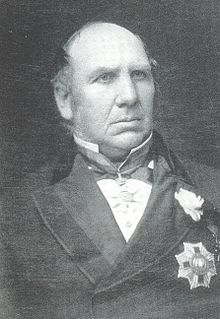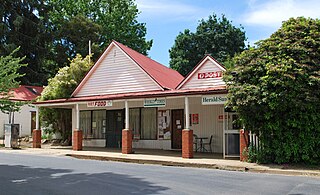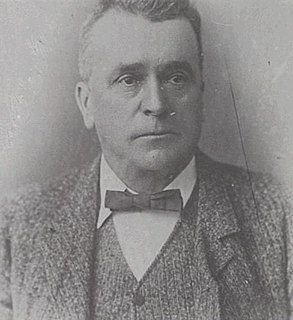Related Research Articles

Sir John O'Shanassy, KCMG, was an Irish-Australian politician who served as the 2nd Premier of Victoria. O'Shanassy was born near Thurles in County Tipperary, Ireland, the son of a surveyor, and came to the Port Phillip District in 1839. He went into business in Melbourne as a draper, and by 1846 he was rich enough to be elected to the Melbourne City Council and to become the founding chairman of the Colonial Bank of Australasia. By the 1850s he was a major landowner and one of the wealthiest men in the colony. He also became a recognised leader of the large Irish Catholic community.

Beechworth is a well-preserved historical town located in the north-east of Victoria, Australia, famous for its major growth during the gold rush days of the mid-1850s. At the 2016 census, Beechworth had a population of 3,859.

Chiltern is a town in Victoria, Australia, in the northeast of the state between Wangaratta and Wodonga, in the Shire of Indigo. At the 2006 census, Chiltern had a population of 1063. It was the birthplace of Prime Minister John McEwan. The town is close to the Chiltern-Mount Pilot National Park. Chiltern was once on the main road between Melbourne and Sydney but is now bypassed by the Hume Freeway running one kilometre to the south.

Stanley is a small town approximately 9 kilometres (5.6 mi) from Beechworth in Victoria noted for its apple and nut farms. At the 2011 census, Stanley had a population of 324.
Mudgee was an electoral district of the Legislative Assembly in the Australian state of New South Wales first created in 1859, partly replacing Wellington and Bligh and named after and including Mudgee. Following the abolition of Goldfields West in 1880, it elected three members simultaneously, with voters casting three votes and the three leading candidates being elected. In 1894 it was divided into the single-member electorates of Mudgee and Rylstone. In 1920, with the introduction of proportional representation it was absorbed into Wammerawa, along with Castlereagh and Liverpool Plains. Mudgee was recreated for the 1927 election. It was abolished in 1968 and replaced by Burrendong.
Members of the New South Wales Legislative Assembly who served in the third parliament of New South Wales held their seats from 1859 to 1860.</ref> The Speaker was Sir Daniel Cooper until 31 January 1860 and then Terence Murray.
Members of the New South Wales Legislative Assembly who served in the sixth parliament of New South Wales held their seats from 1869 to 1872.</ref> The 1869–70 election was held between 3 December 1869 and 10 January 1870 with parliament first meeting on 27 January 1870. There were 72 members elected for 52 single member electorates, 6 two member electorates and 2 four member electorates. Due to a change in the Constitution of New South Wales the maximum term of this parliament was reduced from 5 years to 3. However the assembly was dissolved after only 25 months after the third government of Sir James Martin lost a vote of supply. The Speaker was William Arnold.
Members of the New South Wales Legislative Assembly who served in the seventh parliament of New South Wales held their seats from 1872 to 1874.</ref> The 182 election was held between 13 February and 28 March 1872 with parliament first meeting on 30 April 1872. There were 72 members elected for 52 single member electorates, 6 two member electorates and 2 four member electorates. The maximum term of this parliament was 3 years. However the assembly was dissolved after 32 months. Henry Parkes was the premier for the duration of the parliament. The Speaker was William Arnold.
Members of the New South Wales Legislative Assembly who served in the ninth parliament of New South Wales held their seats from 1877 to 1880.</ref> The 1877 election was held between 24 October and 12 November 1877 with parliament first meeting on 27 November 1877. There were 73 members elected for 53 single member electorates, 6 two member electorates and 2 four member electorates. Premiers during this parliament were Sir John Robertson until 18 December 1877, James Farnell from 18 December 1877 until 21 December 1878 and Sir Henry Parkes from 21 December 1878. The Speaker was Sir George Allen.
Members of the New South Wales Legislative Assembly who served in the 10th parliament of New South Wales held their seats from 1880 to 1882.</ref> Elections for the tenth Legislative Assembly were held between 17 November and 10 December 1880 with parliament first meeting on 15 December 1880. Electoral reforms passed by the ninth parliament had resulted in parliament being expanded to 108 members elected in 43 single member electorates, 25 two member electorates, 1 three member electorate and 3 four member electorates. In addition, electorates franchised on qualifications of occupation or education had been abolished. The parliament had a maximum term of 3 years but was dissolved after 23 months. Sir Henry Parkes continued as the Premier for the duration of the parliament. The Speaker was Sir George Allen.
John Bowie Wilson, was a politician, gold miner and Hydropath in colonial New South Wales, a member of the New South Wales Legislative Assembly for more than 12 years.

Sir Robert Wisdom, was a politician in colonial New South Wales and Attorney General of New South Wales.

James Hoskins was a politician in colonial New South Wales.

John McElhone was an Australian politician.

William Turner was an English-born politician and miner in Victoria and New South Wales, Australia.
The 1859 New South Wales colonial election was for 80 members representing 67 electoral districts. The election was conducted on the basis of a simple majority or first-past-the-post voting system. In this election there were 9 multi-member districts returning 22 members and 58 single member districts. In the multi-member districts each elector could vote for as many candidates as there were vacancies. 15 districts were uncontested.
Mudgee, an electoral district of the Legislative Assembly in the Australian state of New South Wales had two incarnation, from 1859 to 1920 and from 1927 to 1968.
A by-election was held for the New South Wales Legislative Assembly electorate of Mudgee on 6 January 1879 because of the resignation of Sir John Robertson who was then appointed to the Legislative Council, to facilitate the coalition of his supporters and those of Sir Henry Parkes to form an effective government.
A by-election was held for the New South Wales Legislative Assembly electorate of Mudgee on 8 September 1873 because Joseph Innes was appointed to the Legislative Council.
East Macquarie, an electoral district of the Legislative Assembly in the Australian state of New South Wales was created in 1859 and abolished in 1894.
References
- ↑ "Alfred Arthur O'Conner". re-member: a database of all Victorian MPs since 1851. Parliament of Victoria. Retrieved 11 October 2019.
- ↑ "Candidates for the district of Mudgee". The Empire . 25 August 1873. p. 2. Retrieved 11 October 2019– via National Library of Australia.
- ↑ Green, Antony. "1873 results Mudgee". New South Wales Election Results 1856-2007. Parliament of New South Wales . Retrieved 11 October 2019.
- ↑ O'Brien, Antony & O'Brien, Gregory (2005). Shenanigans on the Ovens Goldfields: the 1859 election. Artillery Publishing. ISBN 9780975801307.